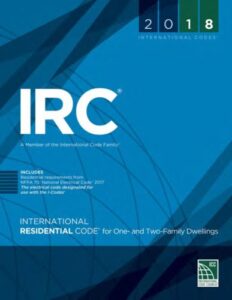International Residential Code 2018
International Residential Code 2018
The International Residential Code 2018 is kept up-to-date through the review of proposed changes submitted by code enforcement officials, industry representatives, design professionals and other interested parties. Proposed changes are carefully considered through an open code development process in which all interested and affected parties may participate.
The ICC Code Development Process reflects principles of openness, transparency, balance, due process and consensus, the principles embodied in OMB Circular A-119, which governs the federal government’s use of private-sector standards. The ICC process is open to anyone; there is no cost to participate, and people can participate without travel cost through the ICC’s cloud-based app, cdp- Access. A broad cross section of interests are represented in the ICC Code Development Process. The codes, which are updated regularly, include safeguards that allow for emergency action when required for health and safety reasons.
You can also read International Property Maintenance Code 2018
In order to ensure that organizations with a direct and material interest in the codes have a voice in the process, the ICC has developed partnerships with key industry segments that support the ICC’s important public safety mission. Some code development committee members were nominated by the following industry partners and approved by the ICC Board:
• National Association of Home Builders (NAHB)
• National Council of Structural Engineers Association (NCSEA)
International Residential Code 2018 Content
- Scope and Administration.
![International Residential Code 2018 International Residential Code 2018]()
- Definitions
- Building Planning.
- Foundations.
- Floors
- Wall Construction.
- Wall Covering.
- Roof-ceiling Construction
- Roof Assemblies.
- Chimneys and Fireplaces.
- Energy Efficiency.
- Mechanical Administration.
- General Mechanical System Requirements.
- Heating and Cooling Equipment and Appliances.
- Exhaust Systems.
- Duct Systems.
- Combustion Air.
- Chimneys and Vents.
- Special Appliances, Equipment and Systems.
- Boilers and Water Heaters.
- Hydronic Piping.
- Special Piping and Storage Systems.
- Solar Thermal Energy Systems.
- Fuel Gas.
- Plumbing Administration.
- General Plumbing Requirements.
- Plumbing Fixtures.
- Water Heaters.
- Water Supply and Distribution.
- Sanitary Drainage.
- Vents.
- Traps.
- Storm Drainage.
- General Requirements.
- Electrical Definitions. and More…….
Download
International Residential Code 2018


Comments are closed.